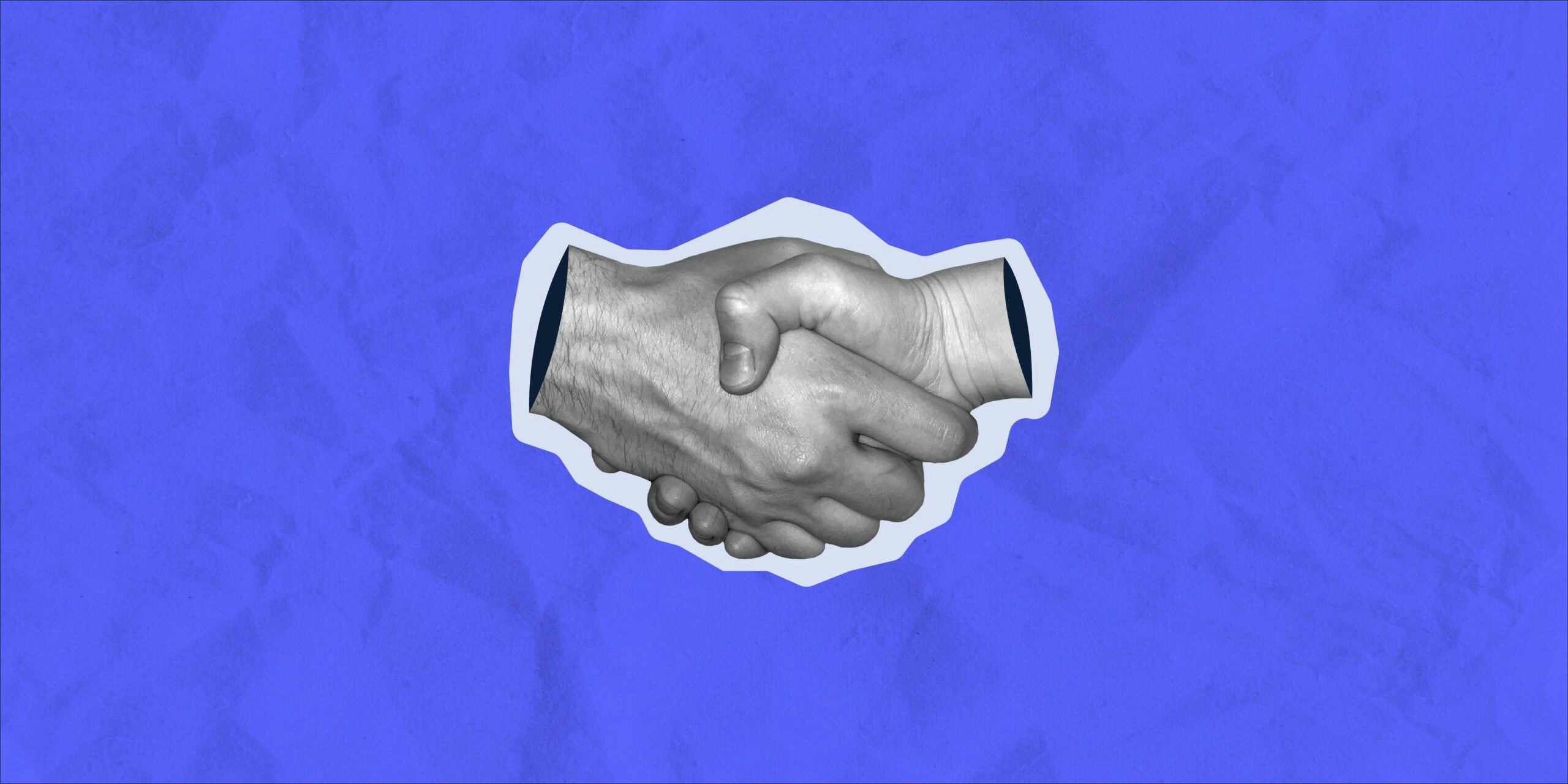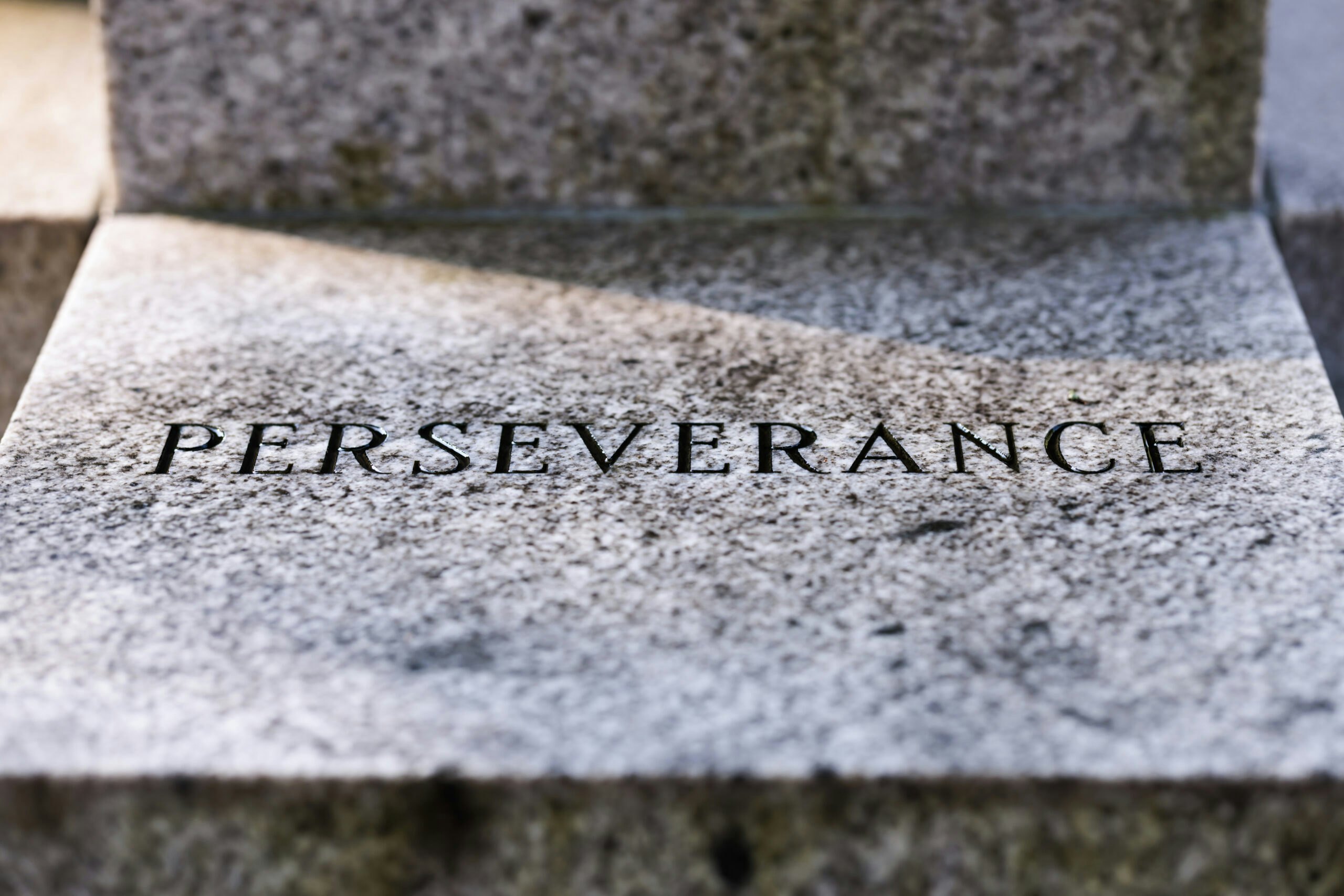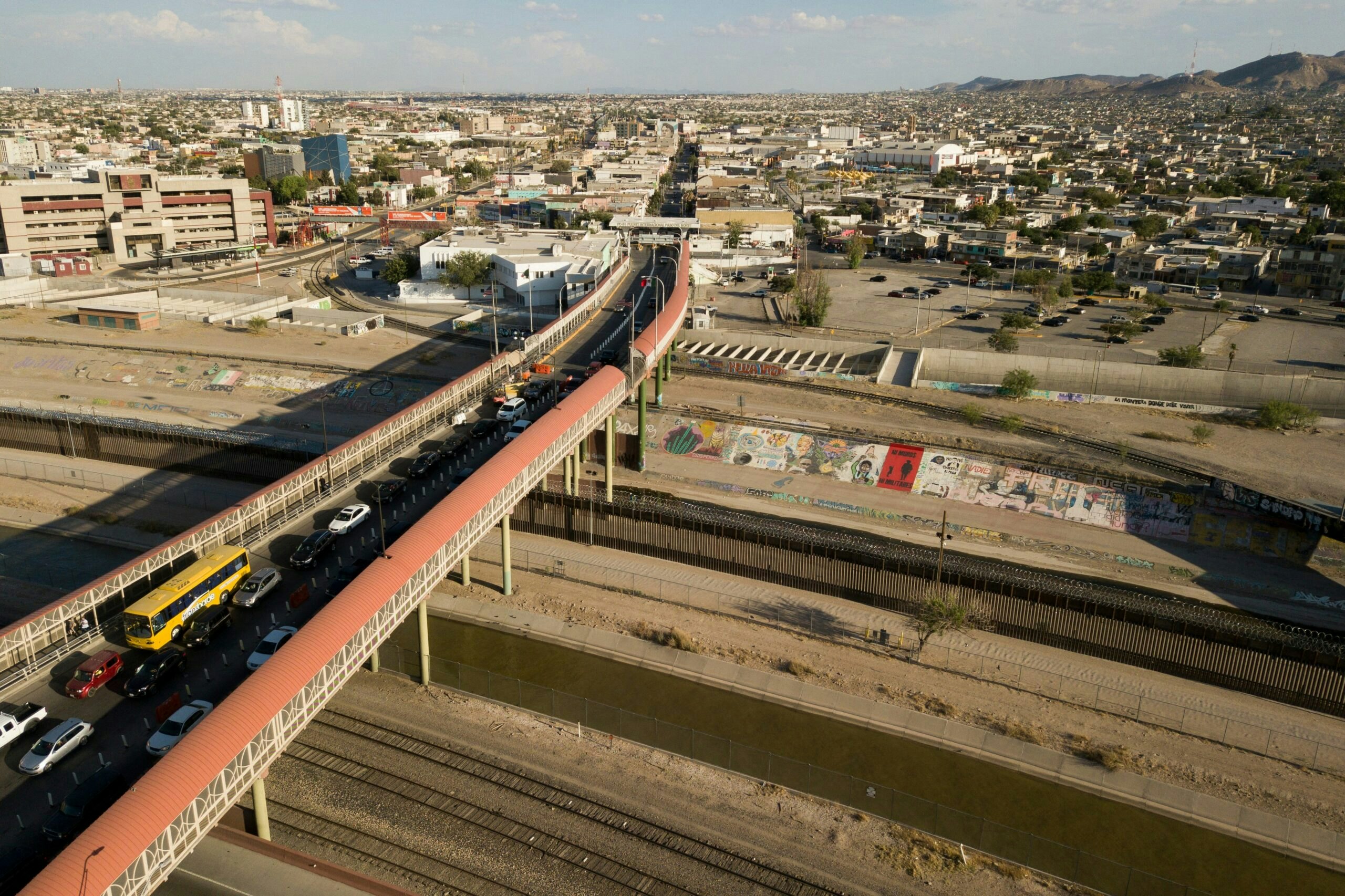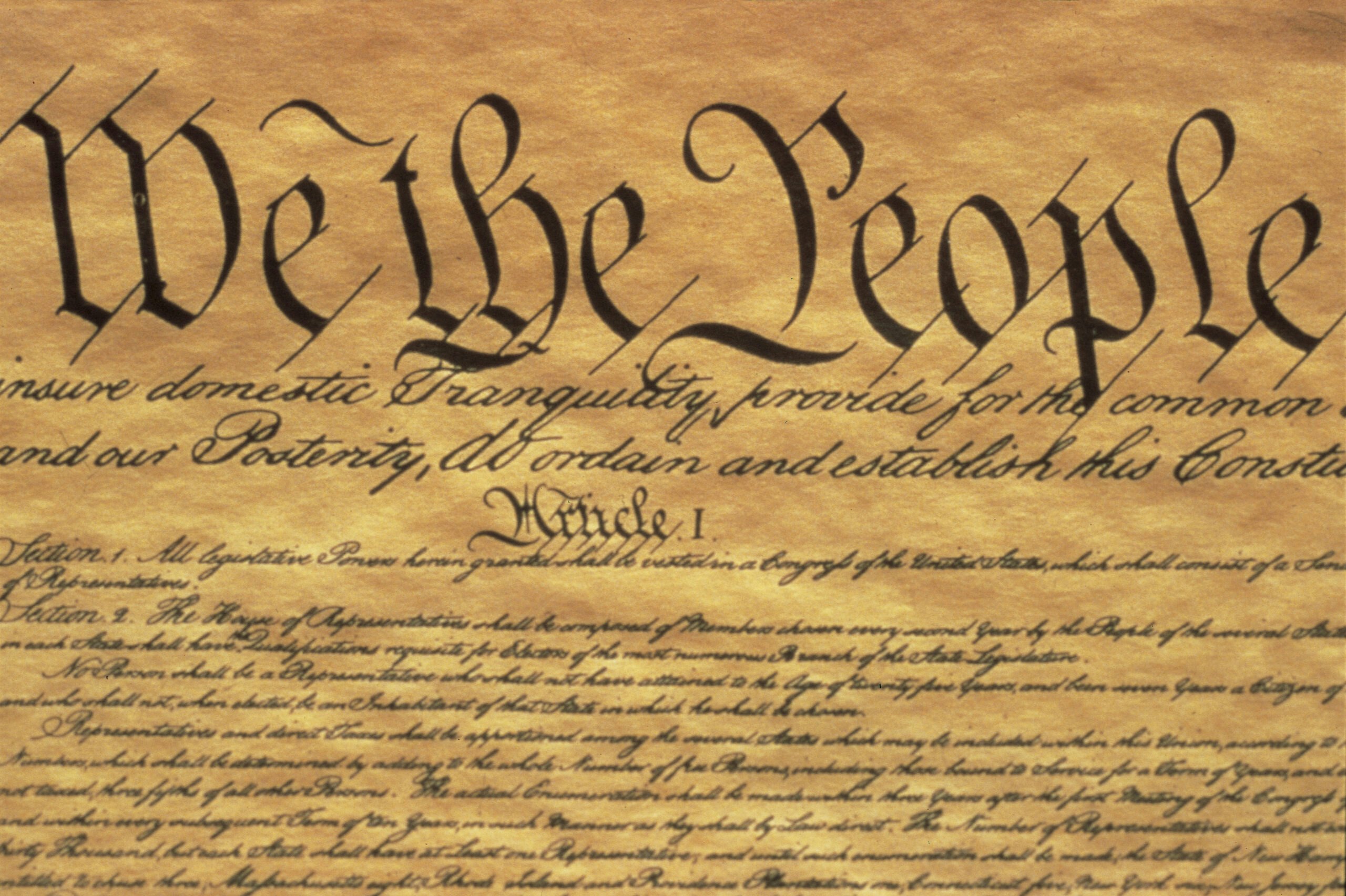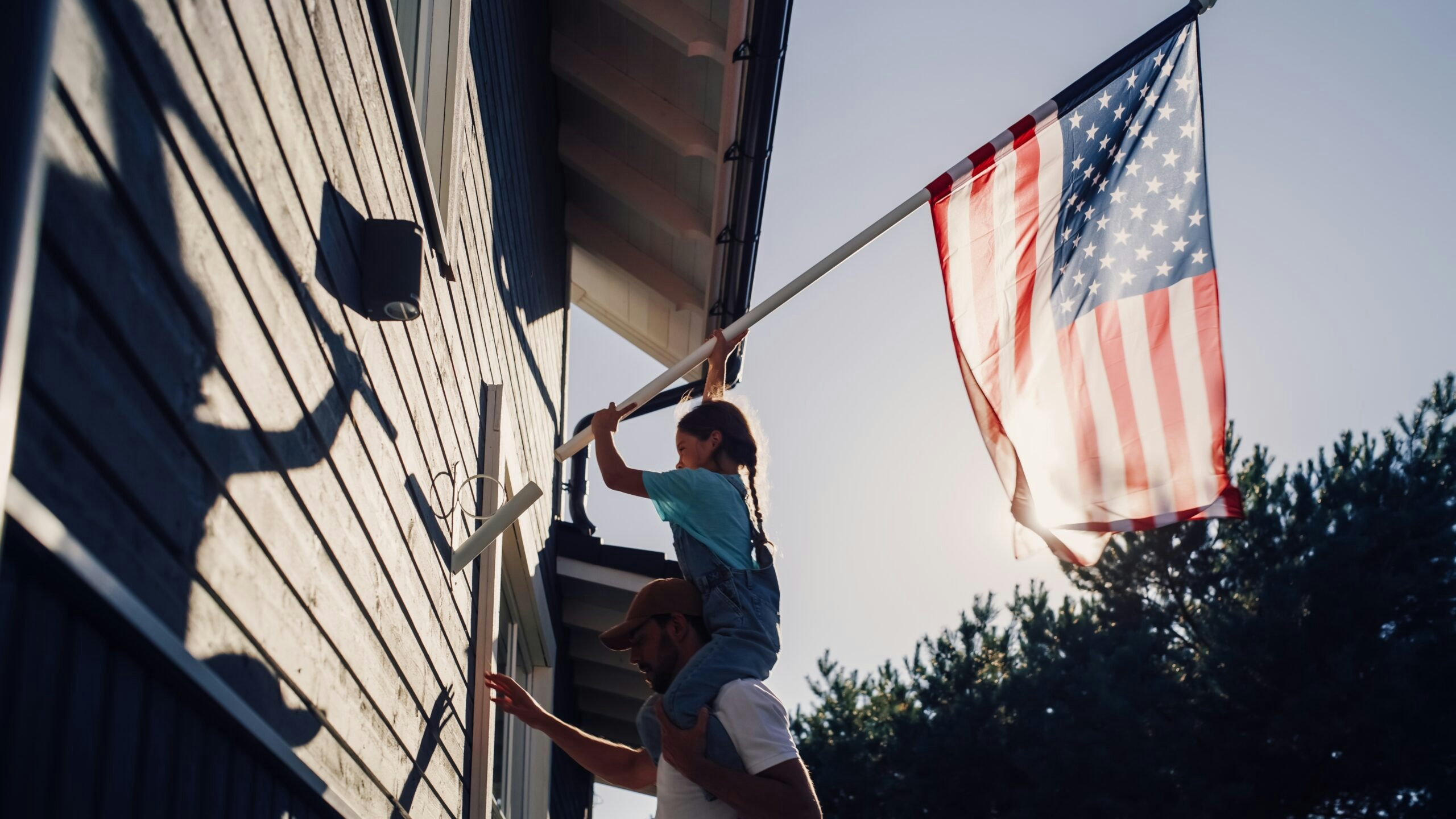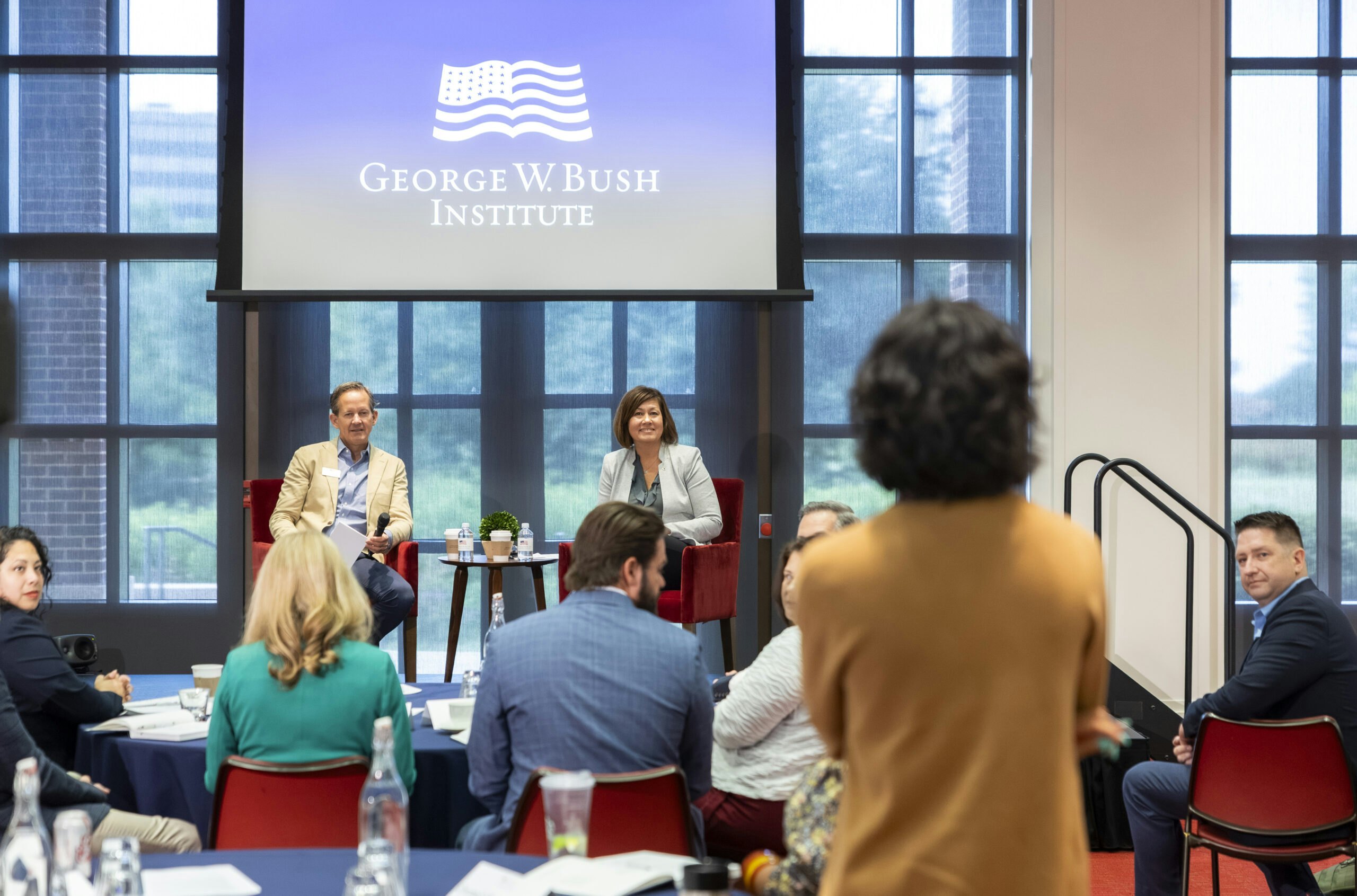Over the coming months, the George W. Bush Institute will explore the nature of pluralism and how it’s working in our country. Improving our commitment to pluralism is intrinsically tied to strengthening our democracy.
On a Saturday morning draped in sunshine, David Holt put pluralism into practice last fall in the streets of Oklahoma City. The 6-foot-6 inch mayor of this city of 700,000 walked block upon block in the city’s annual Hispanic Heritage parade, shaking hands with and waving to constituents.
The crowd gathered two and three deep along a route that snaked its way through a community whose demographics have changed dramatically over the last 30 years. The Capitol Hill neighborhood once was a largely older, White neighborhood. Now, it’s a younger, Latino one.
Brick churches that once served largely White congregations sprinkled the route the two-term mayor walked. Today, the worshipers are drawn from the transformed Hispanic neighborhood. Businesses like the El Nacional de Oklahoma bear signs that speak to the new residents.
One older Latino gentleman called out thanks to Holt for continuing to show up. Not long after that, Holt and his 12-year-old son did a wide circle and started sprinting alongside the crowd, high-fiving onlookers the way Luka Dončić slaps hands with his Dallas Mavericks’ courtside fans after hitting a spectacular 3-pointer.
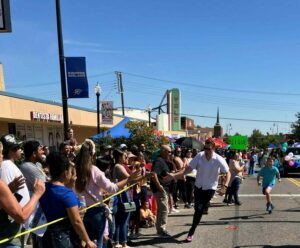
Of course, mayors are supposed to engage with constituents. They meet and greet. Except in Holt’s case, engaging with constituents is a cause. A Republican governing a purple city, the Oklahoma City native is committed to working across his city’s political, social, cultural, and religious lines.
Holt, an attorney, explained his dedication in an opinion essay for The Hill after he won re-election in 2022: “My victory was fueled by the highest voter turnout in 60 years and the votes of people who live in ‘blue,’ ‘red’ and ‘purple’ precincts,” he wrote. “But the real winner wasn’t me. It was Oklahoma City’s experiment in and commitment to pluralism – one that is well worth replicating locally, statewide, and nationally as an antidote for these divisive times.”
The George Washington University graduate amplified those thoughts in an interview last year with conservative commentator Bill Kristol. Holt, his city’s first Native American mayor, cautioned that dividing ourselves into polarizing camps is dehumanizing, while emphasizing that leaders must seek to improve the lives of their constituents.
“I create coalitions of people who want to get things done,” he noted.
The former state senator told us something similar as he walked along the parade route last October: Ultimately, leaders must turn all the energy and goodwill of a parade into policies that benefit a diverse city. Otherwise, you just have diversity for diversity’s sake.
“A Republican governing in a purple city, the Oklahoma City native is committed to working across his city’s political, social, cultural, and religious lines.”
We hear plenty these days about diversity, and we should. America’s ethnic, religious, and cultural breadth separates it from countries where national identity is rooted in one’s bloodlines or ethnic tribe. Timothy Garton Ash, the Oxford University professor and Hoover Institution Senior Fellow, noted in a Democracy Talks interview that in nations like Germany: “The folk, the people, would be defined by blood and soil. It would be an ethnic definition of the people. The U.S. definition of the people, like also the French and British definition, is a civic democratic definition.”
Americans can be thankful that “we the people” remains at the root of our nation’s experiment in self-governing. Still, an enduring commitment to pluralism must match the diversity that “we the people” embodies. At its core, pluralism requires us to embrace and respect our various identities while striving to work through them in search of a common goal.
Harvard University’s Pluralism Project describes the distinction between diversity and pluralism this way:
“All of America’s diversity, old and new, does not add up to pluralism. ‘Pluralism’ and ‘diversity’ are sometimes used as if they were synonymous, but diversity – splendid, colorful, and perhaps threatening – is not pluralism. Pluralism is the engagement that creates a common society from all that diversity.”
Local communities are a breeding ground for pluralism
Examining local communities is one way to understand how pluralism can strengthen our democracy. For complex reasons, including that national politics remains too dominated by loud extremists, our cities, towns, and villages are where you more likely will find leaders and citizens working across party lines.
Holt offers as an example Oklahoma City’s Metropolitan Area Projects (MAPS) initiative. Fueled originally by an increase in local sales taxes 30 years ago, MAPS has grown into a $1.1 billion set of projects.
Holt described the initiative this way in the Dallas Morning News: “The mix of projects reflects many different worldviews, and different projects were pleasing to different constituencies.” MAPS 4, the latest incarnation of the initiative, passed in 2019 with 72% of voters favoring the community-building work which, as Holt wrote, ranges “from mental health services and a civil rights center to economic development and stadiums.”
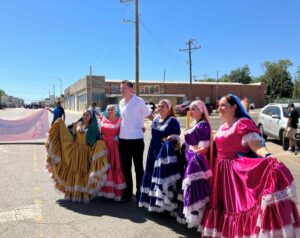
He also has focused on bridging the divides among Oklahoma City’s various neighborhoods and ethnic groups. One tangible aspect is a new park that connects the city’s downtown life to the Capitol Hill neighborhood south of the central city. The city’s leader even coaxed organizers to start the Hispanic Heritage Parade at the park to emphasize the new connection. (Rebuilding underground a longstanding highway that divided the two sides of the city helped facilitate the connection, too.)
“Examining local communities is one way to understand how pluralism can strengthen our democracy.”
Of course, Oklahoma City faces its share of challenges, including hard truths about policing. Oklahoma’s capital city once ranked second among the Nation’s largest towns for the rate of people killed by police.
After George Floyd’s murder, Mayor Holt convened a group of residents with wide-ranging experiences and perspectives to address changes in policing. A task force was formed, an outside firm was hired, and 39 recommendations were produced. Some of them already have been implemented.
Some votes to tackle the city’s challenges barely pass, though. Last July, the Oklahoma City Council approved in a 5-4 split the recreation of a local Human Rights Commission that had been abolished three decades ago over disputes about protecting residents against discrimination because of their sexual orientation. The commission, which Holt voted to renew, addresses citizens’ charges of discrimination and promotes human rights across the city.
Holt credited Oklahoma’s political culture for the admittedly narrow passage of the panel, which held its first meeting as 2023 began. “Development of a proposal that could pass a politically diverse council required reliance – once again – upon our city’s rich tradition of compromise,” he said.
A spirit of compromise, which is an essential ingredient of pluralism, is more likely to take root in local communities for a simple reason: Local issues often are not national issues. As Glenn Whitley, a former Texas county judge, told us: “At the local level, we are a neighborhood.”
Many voters certainly see it that way. Compared to the Federal Government, and even statehouses, Americans express less distrust in their local leaders and institutions.
A 2022 State Policy Network poll showed that only 18% of respondents cited “power-hungry politicians” as a reason to distrust city and local officials. By contrast, 36% believed such leaders are ruining the Federal Government while 25% contend they are a reason to distrust state government.
Naturally, local voters and their leaders don’t always see eye-to-eye on matters. But they do see each other in person, and that matters. As former Dallas Mayor Mike Rawlings told us, “There is more body contact at the local level.”
Familiarity like that helps communities get things done. Knowing your neighbor helps strip away much of the bile and invectives that Americans throw at each other via social media, cable news, and talk radio. “They recognize that sometimes our way of life might not make sense in theory, but it makes sense in practice as we live together as neighbors and take each other seriously and respect each other,” Yuval Levin, Director of Social, Cultural, and Constitutional Studies at the American Enterprise Institute, says about local residents and their communities.
“A spirit of compromise, which is an essential ingredient of pluralism, is more likely to take root in local communities for a simple reason: Local issues often are not national issues.”
Local mediating institutions play a key role by buffering tensions as well. Chambers of Commerce. Rotary Clubs. Lions Clubs. Neighborhood associations. Churches, synagogues, and mosques. Local groups like these differ from the lobbying class in Washington that gets paid to prevail on particular interests. By contrast, civic organizations help communities pursue remedies to their shared problems.
In Dallas, where we work and live, a good example of a forward-thinking nonprofit is the Commit Partnership. Former Goldman Sachs executive Todd Williams launched the project a decade ago after seeing Dallas’ public schools fall behind academically.
Commit supplies the Dallas Independent School District as well as districts across North Texas with the data and information they need to help students improve their academic achievements. With more than 200 partners and 60 staff members, the organization’s ultimate aim is to ensure that at least half of all 25-to 34-year-old North Texans have an opportunity to earn a livable wage by 2040.
At the local level, you also will find what Frederick Riley, Director of the Aspen Institute’s Weave Initiative, terms “trust brokers.” These are residents who take it upon themselves to create connections.
In a Bush Institute interview, Riley recalled a woman in Chicago who could have left the poverty, crime, and despair so prevalent in her neighborhood. But she remained, deciding she couldn’t be one more person who gave up on the neighborhood. Instead, she created a nonprofit organization with her neighbors. Together, they bought three vacant lots and turned them into parks, playgrounds, and a safe place for the neighborhood’s youths.
James and Deborah Fallows, the authors of “Our Towns,” found something similar as they crisscrossed America in search of what works in places removed from the intensity of the national spotlight. Successful versus struggling cities, Jim Fallows told The Catalyst, have “identifiable civic-connection groups.” Those might be longstanding institutions like the Rotary Club or new ones like a local food organization. Whatever the form, the institutions create connections across a community.
Another common feature the couple discovered in their reporting was that successful communities know their civic stories. Towns that moved ahead after experiencing an upheaval shared a sense of where they were going and why they were going there. In other words, they had a common narrative and create “a sense of us.”
Miami Mayor Francis Suarez offers his own take on developing “a sense of us.” He believes that focusing on common values as opposed to politics is the best way to create a shared local identity. Discover those values and then build upon them as a city, he told us. Cities are more likely to get things done by concentrating on those values and their city’s common elements.
Of course, cities can end up having to deal with unresolved national issues. America’s ongoing immigration crisis is an unfortunate, but true example. A border community like El Paso, Texas cannot afford to get bogged down in partisan battles over new arrivals to America. Local leaders, volunteers, and organizations must figure out how to care for families, provide them shelter, and, of course, detain those who fail to follow the law.
Our colleague Cullum Clark, Director of the Bush Institute-SMU Economic Growth Initiative and a SMU Adjunct Economics Professor, reports that cities like suburban Prosper, Texas, aren’t waiting for the Federal Government to modernize our immigration system. They are proceeding with hard conversations about being a place that welcomes immigrants.
This effort requires working collaboratively with local organizations to make the effort succeed. Clark notes the strategy has helped places like Dayton, Ohio, and Lancaster, Pennsylvania, assimilate immigrants into their communities.
Such work is not easy, just as cities face major challenges when it comes to confronting crime, rooting out corruption, streamlining bureaucracies, securing enough affordable housing, reforming police departments, dealing with people experiencing homelessness, and managing fiscal shortfalls. More recently, cities have had to live with the fallout of the first pandemic in a century.
For these reasons, we do not pretend that cities lack major problems or political upheavals. Chicago voters, for example, recently defeated Mayor Lori Lightfoot’s bid for a second term.
Still, cities are more likely to address their challenges today with less grandstanding, fewer partisan breakdowns, and more compromise. After all, there is that familiarity. And there are no Republican or Democratic roads and bridges, water supplies and sewage systems, or schools and hospitals. They all belong to the community and the community’s neighbors must figure out how to make them work. They have no choice but, as Levin says, to live out their vision of the good.
Making pluralism work and relevant
As Americans, we have a vested interest in communities living out their vision of the common good. If neighbors believe their hometowns don’t serve their interests, they are likely to join the chorus of Americans who wonder whether their democracy will deliver for them.
About the time that Mayor Holt marched in the Oklahoma City parade last fall, a New York Times/Siena College survey found that 68% of registered voters believed the Federal Government only serves the interests of elites. They did not think it represents the interests of the broad public. Our democracy will suffer if that same belief works its way down to local governments.
Living out a vision of the good doesn’t just happen, though. It requires creating incentives to collaborate, enacting smart strategies, and developing effective leadership. All of which gets to the heart of a pluralistic society: working through our differences for the common good, which cities attempt to strengthen through delivering services like public safety and community hospitals.
David Holt believes it is still possible to create broad governing coalitions, despite all the headlines about polarization. But getting to that point requires giving leaders reasons to reach beyond their most loyal supporters.
Holt credits the top-two format of Oklahoma City’s mayoral contests for creating incentives to build a wide base of support. Mayoral candidates run at large and without any party affiliation. If no candidate wins a majority in the first round, the top two finishers advance to the second and last round.
Holt contends that this format emboldens a pragmatic center. Candidates must campaign among a broad cross-section of voters and win more than their most devoted backers. “You must face everybody,” he emphasizes. In his estimation, this approach breaks down election silos and allows for “the much larger electorate in the middle to work together, regardless of party registration.”
“Holt credits the top two format of Oklahoma City’s mayoral contests for creating incentives to build a wide base of support.”
Dallas employs a similar system. Mayoral candidates run as nonpartisans in open elections. If no one wins 50% of the vote, then the top two finishers move to the runoff.
Variations of the top finishers in an open contest are emerging around the country. A decade ago, California adopted an open primary for congressional contests as well as for state offices. The top two vote getters advance to a runoff, regardless of party affiliation. (The state’s open primary system does not apply to presidential races or local offices.)
Nebraska, Louisiana, and Washington also have nonpartisan primaries for at least some elected offices. The top two finishers in their selected primaries advance to the general election, where the eventual victor must win at least 50% of the turnout.
Some places, including cities like New York, let voters rank their choices in an election. The general principle of a “ranked choice” format is that voters prioritize more than one candidate on their ballot. The person who wins the fewest votes is dismissed from the next round of voting, while the second choices of his or her supporters are distributed to the remaining candidates. The winnowing process continues until a candidate secures a majority of the vote.
This concept exists in various shapes and sizes. In Alaska, for example, the top four winners for all races in the state’s open primary advance to the general election. Voters then are allowed to rank their top four choices, with the winnowing process leading to an eventual victor in the general election.
The Virginia GOP used a ranked-choice format in 2021 to select a gubernatorial nominee among seven candidates. The eventual victor had to receive a majority of the votes. Some contend that led to the nomination of Glenn Youngkin, who was the most adept at securing the broadest range of the party’s roughly 53,000 delegates. Youngkin, of course, went on to win the Virginia governor’s race in 2021.
Ranked-choice voting certainly has its critics and counter arguments. Some contend that it limits the opportunity for a party’s favorite to win a race because voters may not cross the aisle in a meaningful way. Others claim that voters must go in with a strategy, as opposed to going to support the candidate they prefer. And some argue that ranked-choice elections are too complex.
We believe that the best course would be for individual states and communities to experiment with new forms of elections that give voice to more than vocal extremists. See whether new formats lead to more effective governing and allow more voters to hold officials accountable. If they do, what form or forms work best?
Once communities have more data, they can decide which type of new election, if any, serves the larger good. Let the breadth and depth of our country work to our advantage. Experiment locally and see what springs up from the bottom. If a community or a state doesn’t like the new format, ditch it. If voters like the new system, use it, and perhaps expand the alternative. This spirit of innovation in communities and states is in keeping with our federalist form of government.
Making pluralism work also requires having the right processes in place for people to collaborate. “Purposeful process matters,” Mike Rawlings, the former two-term mayor of Dallas, told us.
The former Pizza Hut CEO pointed to a commission that he set up in Dallas to recommend how the city might proceed with markers and statues honoring Confederate veterans. They included a statue of Robert E. Lee that President Franklin D. Roosevelt dedicated in 1936. After the violent 2017 Unite the Right rally in Charlottesville, Virginia, many people called for removal of the statue of Lee on horseback.
The commission let each of Dallas’ 14 council members name a representative to the body. Rawlings led the council to review the panel’s recommendation, which was to take down Confederate markers, including the Lee statue. There were disparate viewpoints on the subject, but the process allowed residents of various backgrounds to voice their opinions.
“Leaders create processes,” Rawlings emphasizes. He acknowledges that he made mistakes when he didn’t put good processes in place. But he believes good processes are necessary to facilitate pluralism, where citizens from different backgrounds and perspectives attempt to resolve a shared problem.
“Making pluralism work also requires having the right processes in place for people to collaborate. ‘Purposeful process matters,’ Mike Rawlings, the former two-term mayor of Dallas, told us.”
A former advertising executive, Rawlings’ theory for setting up an effective process is to first go to the “heavy users.” Find those people most interested in a subject. Then get a sponsoring body, whether that is the mayor, a local college, or a civic organization. Enlist them in the process and show the media what the group is attempting to achieve. These steps will help the process take root and grow.
Rawlings believes that so much of making pluralism work is simply showing up, as Holt exemplified by marching in the Oklahoma City parade. Meet with people who vehemently oppose you, hear them out, and let them hear your views, Rawlings says. This is what he calls “the tilling work.” And meet with people when you aren’t there to ask something from them or their neighborhood.
He also adds that it’s important to show people why pluralism matters – and why it can even be enjoyable. Participating in something as simple as a cross-cultural event shows people the benefits of a pluralistic society. “This is not just ‘take your cough medicine,’’’ he says.
All this work requires leadership. That includes from citizens who will not walk away from their community’s problems and will engage with people with whom they differ.
Making pluralism work and relevant particularly depends upon leaders who strive to create a common narrative among their differing constituents. These leaders may be elected by their constituents or respected by their community for their civic engagement. Either way, their pragmatic idealism drives them, they sidestep the overly simplified answers that extremists offer, and they consider their opponents well-intentioned adversaries, not mortal enemies.
They also understand what social psychologists like Jonathan Haidt report: Building social capital generates the high levels of trust that stabilize successful democracies.
“Making pluralism work and relevant particularly depends upon leaders who strive to create a common narrative among their differing constituents.”
Unfortunately, there is a darker reason to make pluralism work and relevant. You will find an example a short 10-minute drive from where Holt walked the parade route last fall.
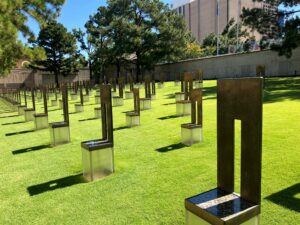
There stands the Oklahoma City National Memorial and Museum, a site that solemnly commemorates the violent, deadly extremism that exploded in the heart of the city on April 19, 1995. On that horrific morning, Timothy McVeigh ignited a car bomb next to the Alfred P. Murrah Federal Building, killing 168 people, including 19 children, and injuring dozens of others.
Today, on the very same ground where terrorism once reigned, sits a Field of Empty Chairs – 168 of them that symbolize the life and death of each lost American. Nearby stand two gates at opposite ends of a reflecting pool. The East Gate represents how innocence still existed at 9:01 a.m. that morning. At 9:02, the time of the explosion, destruction abounded. The West Gate marks the moment when healing began at 9:03 a.m.
Oklahoma City shows how a city moved on, choosing to work across the lines that divide so many Americans. The example shows us that we can overcome our divisions. Not easily – not at all. But engaging in pluralism will strengthen our communities, our Nation, and our democracy. The choice is ours.

















